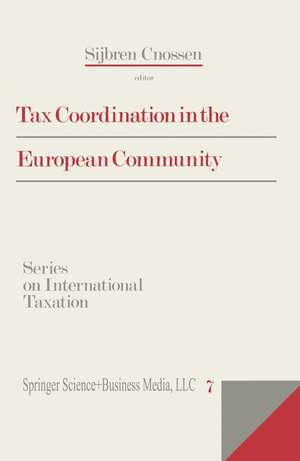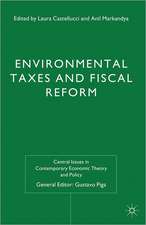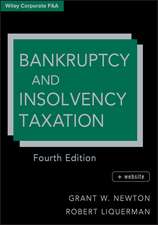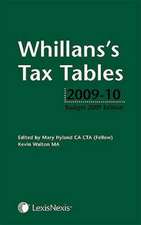Tax Coordination in the European Community
Autor Sijbren Cnossenen Limba Engleză Paperback – 8 ian 2013
| Toate formatele și edițiile | Preț | Express |
|---|---|---|
| Paperback (1) | 393.74 lei 6-8 săpt. | |
| SPRINGER NETHERLANDS – 8 ian 2013 | 393.74 lei 6-8 săpt. | |
| Hardback (1) | 2347.63 lei 6-8 săpt. | |
| Springer – 8 mar 1987 | 2347.63 lei 6-8 săpt. |
Preț: 393.74 lei
Nou
Puncte Express: 591
Preț estimativ în valută:
75.34€ • 78.82$ • 62.59£
75.34€ • 78.82$ • 62.59£
Carte tipărită la comandă
Livrare economică 02-16 aprilie
Preluare comenzi: 021 569.72.76
Specificații
ISBN-13: 9789401732086
ISBN-10: 9401732086
Pagini: 392
Ilustrații: X, 377 p.
Dimensiuni: 155 x 235 x 21 mm
Greutate: 0.55 kg
Ediția:Softcover reprint of the original 1st ed. 1987
Editura: SPRINGER NETHERLANDS
Colecția Springer
Locul publicării:Dordrecht, Netherlands
ISBN-10: 9401732086
Pagini: 392
Ilustrații: X, 377 p.
Dimensiuni: 155 x 235 x 21 mm
Greutate: 0.55 kg
Ediția:Softcover reprint of the original 1st ed. 1987
Editura: SPRINGER NETHERLANDS
Colecția Springer
Locul publicării:Dordrecht, Netherlands
Public țintă
ResearchCuprins
1. Tax Structure Developments.- 2. Coordination of Value-Added Taxes.- 3. Alcohol and Tobacco Taxes: Criteria for Harmonisation.- 4. Optimal Tax Perspective on Tax Coordination.- 5. Motor Vehicle Tax Harmonization.- 6. Price Discrimination and Tax Differences in the European Motor Industry.- 7. Interjurisdictional Coordination of Taxes on Capital Income.- 8. Corporate-Personal Tax Integration.- 9. Taxation and the Cost of Capital: A Comparison of Six EC Countries.- 10. Determination of Company Profits.- 11. Tax Harmonisation and Labour Mobility.- 12. Personal Income Taxes: The Treatment of Tax Expenditures.- 13. The European Monetary System and Fiscal Policies.- Participants.- Name Index.
Descriere
Descriere de la o altă ediție sau format:
The results of the work of the Conference on Tax Coordination in the European Community appear at a time when the Community has undertaken, as a priority task, the completion of the internal market. The Commission's programme and proposed timetable for the achievement of that goal are spelt out in the White Paper, which was endorsed by the European Council at Milan in June 1985, an endorsement which was repeated at the Council's subsequent meeting in Luxemburg in December 1985. The Commission wholly endorses the views of the Conference as regards the need for urgent action to remove the grave restrictions on the free movement of the factors of production which continue to exist within the Community. It is the Commission's firm view that only a true dismantling of fiscal frontiers can permit the creation of an area without internal frontiers for which the Single European Act provides. To that end a certain approximation of rates of indirect taxation is indispensable if unacceptable distortion of competition is to be avoided. It is noteworthy that the Conference attaches great importance to the Community's problems in the field of direct taxation. This work will be particularly useful to the Commission, which intends to produce a further White Paper on company taxation in the near future. As the Conference rightly notes, action in this field is important for equalisation of the conditions of competition necessary for the completion of the internal market.
The results of the work of the Conference on Tax Coordination in the European Community appear at a time when the Community has undertaken, as a priority task, the completion of the internal market. The Commission's programme and proposed timetable for the achievement of that goal are spelt out in the White Paper, which was endorsed by the European Council at Milan in June 1985, an endorsement which was repeated at the Council's subsequent meeting in Luxemburg in December 1985. The Commission wholly endorses the views of the Conference as regards the need for urgent action to remove the grave restrictions on the free movement of the factors of production which continue to exist within the Community. It is the Commission's firm view that only a true dismantling of fiscal frontiers can permit the creation of an area without internal frontiers for which the Single European Act provides. To that end a certain approximation of rates of indirect taxation is indispensable if unacceptable distortion of competition is to be avoided. It is noteworthy that the Conference attaches great importance to the Community's problems in the field of direct taxation. This work will be particularly useful to the Commission, which intends to produce a further White Paper on company taxation in the near future. As the Conference rightly notes, action in this field is important for equalisation of the conditions of competition necessary for the completion of the internal market.









